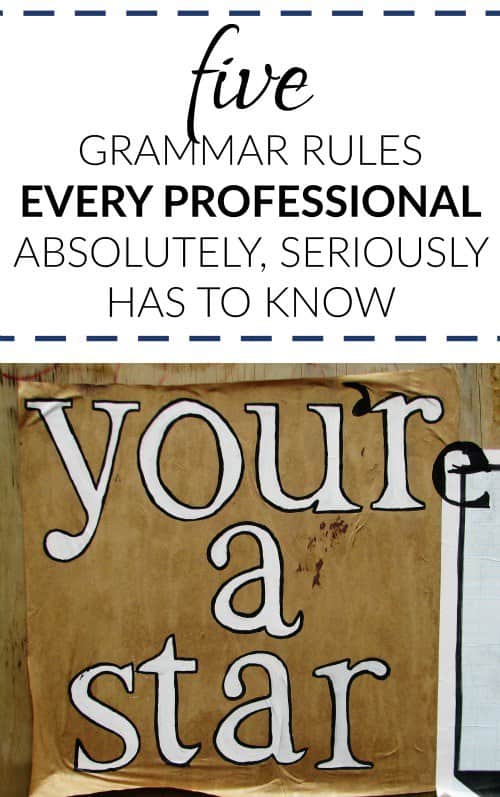This post may contain affiliate links and Corporette® may earn commissions for purchases made through links in this post. As an Amazon Associate, I earn from qualifying purchases.

If you want to be taken seriously as a professional, good grammar matters! Particularly for lawyers, where you get major points for knowing your Bluebook and local style conventions, there can be some serious grammar nerds around — and they will judge you if you use “none” as a plural or confuse further and farther.
Even those of us not working with grammar nerds need to get at least SOME grammar rules straight, though!
This is my list of the five grammar rules you must know if you want to be taken seriously:
- Your/You're
- They're/Their/There
- Its/It's — and other general apostrophe problems.
- Proper use of commas. This a huge topic, but it's one worth knowing well because so many things can go wrong with commas. Whether it's an error like “eats, shoots & leaves” or an error like “I'm coming to eat Grandfather,” they drive me batty. This Grammarly page looks like a good overview.
- Word choice — specifically as it applies to your industry. This is a pretty open ended suggestion, but in some ways it matters the most! For example, you wouldn't want to work with a First Amendment lawyer who used “slander” and “libel” interchangeably… or a wedding planner who misspelled “stationery.” You should be absolutely sure you understand the meaning and proper usage of any words you use often at work, as well as any terms of art.
Ladies, what does your list of “must know” grammar rules include? Which grammar mistakes bug you the most? (Here's our last discussion on grammar annoyances.)
Further Reading:
- Eats, Shoots & Leaves by Lynne Truss [$11.93 at Amazon]
- Top Ten Grammar Myths [Grammar Girl]
- Language Myths [Grammarphobia]
- Sorry, grammar nerds. The singular ‘they' has been declared Word of the Year. [Wonkblog, Washington Post]
Pictured: Pedantry FAIL, originally uploaded to Flickr by Tom Beard.


Amy H.
IME, *very* few people even in the corporate/professional world know the hyphenation rules/apply them properly.
jwalk
Bare vs. bear. Makes me cringe every time.
“Please bare with me.” No, I’m not interested in getting naked with you.
Anonymous
Then and than confusion makes me stubby. I can’t get why people use “then” when “than” is the correct word.
Anonymous
oh autocorrect. stabby, not stubby.
G
Many of the people I wirk with do not have English as first language. Still, principal and principle or staff and stuff are just not the same thing.
G
typo. Many of the people I work with.
In-House Europe
As others have said…This whole thread just makes me so happy.
#foundmyhive
;)
L
This is pretty basic, but I have had a major problem with assistants using incomplete sentences in emails. That feels really unprofessional to me, and I wince when those communications go outside the company.
Rebecca
Most of my pet peeves have been mentioned! One of my big cringe-inducers: everyday vs. every day.
You do something every day. That makes it an everyday occurrence.
Isabet
My very pettest peeve: flout and flaunt. One flouts the law; one can only flaunt the law if one has a particularly gaudy copy of Civil Procedure. One may flaunt one’s disrespect for the law, of course.
And although I recognize I’m on the wrong side of history on this one, I still believe what while you may wear a brooch, you can only broach a topic. (Or a keg, I suppose.)
Anon
I’m surprised no one has mentioned “based off.” This drives me nuts!
Legal
to, too & two.
And using text speak in professional emails. I have gotten emails from judges/lawyers with “lol” and :)
than and then
Please, for the love of god, proof your emails, orders and briefs for spelling mistakes.
Also, comic sans has no place in the workplace!
One more, no need to bold and underline and italic at the same time. One is fine to get your point across.
Legal
One more,
Please DO NOT REPLY ALL….
when replying to an email, just hit Reply, not reply all.
Thanks
Anonymous
Usage cringe: “Gift” as a verb. “He gifted me a silk blouse for my birthday.” Why did perfectly serviceable “gave” fall by the wayside?
Anonymous
The incorrect and rampant use of “myself”. People shouldn’t type “please contact myself” in an email, then look surprised when I walk over to touch them. It’s not your run of the mill pronoun – it’s reflexive!